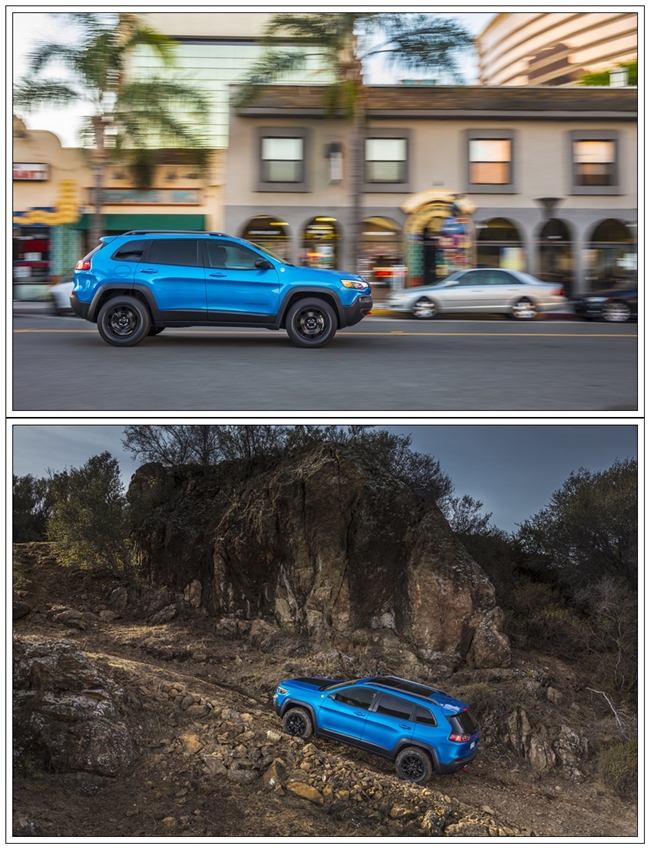It’s funny how an observation one makes that is harshly criticized at the time eventually turns into reality.
A little under 2 years ago I did a video review of the 2017 Jeep Cherokee Trailhawk and posted it to my You Tube channel. Among the many opinions I expressed in the review was the fact that the Trailhawk only came with Jeep’s 3.2L V6 engine, and given that many purchasers use this Trail Rated vehicle don’t actually take it on trails, an available 4-cylinder option would have been good to have as well. While the Cherokee came in many trim levels that did offer their 2.4L Tigershark engine, buyers were drawn to the more aggressive look of the Trailhawk, with it’s tow hooks and higher clearance among other features. So, given the fact that many buy the Trailhawk for looks and not necessarily to go off-roading, the lack of a more efficient 4-cylinder engine option seemed to be a noteworthy omission.
When the comments began to appear on the video, it seemed not everyone agreed with my opinion.
Most of the feedback focused on the fact that the 2.4L Tigershark with its 184 horsepower and 171 lb/ft of torque was simply not powerful enough to take the vehicle onto off-road trails. They said that the 3.2L V6 and its combination of 271 horsepower and 239 lb/ft of torque was necessary, and I often replied that while they may be correct for off-roading, not everyone was buying the Trailhawk to go off-roading. Opinions were hardened though and aside from a few obnoxious nut jobs, the disagreements were hardened but respectful.
However, as we move ahead to the launch of the next-generation 2019 Jeep Cherokee, we suddenly see that the Trailhawk has not one engine option to choose from, but two…and yes, one of those options is a 4-cylinder.
It seems that I was not the only one who noticed how Trailhawk buyers weren’t always (or often) off-roaders, and the design team at Jeep needed to provide more options to be able to both please those looking for off-road capability as well as individuals who prefer the look of the trail-rated Cherokee but don’t need the extra power and lower fuel economy.
The 2019 Jeep Cherokee Trailhawk now offers both its traditional 3.2L V6 as well as an all-new option, a 2.0L Turbocharged 4-cylinder engine that puts out 270 horsepower and an impressive 295 lb/ft of torque. While the base 2.4L Tigershark engine is still available on other trim levels of the Cherokee, it is not offered on the Trailhawk.
By adding this new 2.0L Turbocharged engine to the Cherokee Trailhawk mix, Jeep drivers now have an engine option that provides equivalent horsepower to the six-cylinder but at the same time offers greater torque as well as improved fuel economy. The 2.0L turbo has a combined fuel economy rating of 9.1 L/100 KM or 25.8 US MPG (37 IMP MPG). By comparison the 3.2L V6 numbers are 10.2 L/100 KM or 23.1 US MPG (28 IMP MPG). This equates to an approximately 12% improvement in fuel economy without giving up horsepower and even increasing the available torque.
While there will still be buyers who can’t be convinced that a 4-cylinder engine can offer the appropriate amount of power and torque needed to head out into the off-roading challenges that the Trailhawk was built for, the mere fact that it’s now available is certainly an acknowledgment by Jeep engineers that it certainly can.
During my own week with the 2.0L turbo variant, I found the Trailhawk to be powerful and fun to drive. While I did not take it deep into the wilderness for some true off-road testing, I did try it out on as varied terrain as I could find. This included roads with steep inclines as well as various road surfaces. It compared very favorably to the similar driving situations I did when driving the 2017 Trailhawk V6 and I believe that in true off-road conditions this new turbo-4 would be just as capable as any previous engine offered on the trail-rated Cherokee.
The only drawback at the moment to opting for the 2.0L turbo when buying a Trailhawk is the fact that Jeep puts an almost one-thousand-dollar premium in Canada on the choice, and a five-hundred-dollar premium in the U.S. The cost savings of using less gas is suddenly mitigated initially by the higher price tag, stretching out the ROI to a longer period of time. However, the mere fact that fuel reduction is available without any sense of sacrificing performance is noteworthy nonetheless and will have appeal to a range of buyers greater than perhaps some will suspect.
Now that the argument over the viability of a 4-cylinder engine on a trail-rated Jeep Cherokee has been settled, perhaps we should even look to the next level of powertrain development. Can anyone say…off-roading Jeep hybrid?!


Leave a Reply